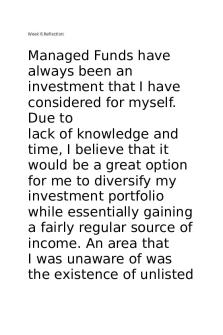HR Week 5 - week5 PDF

| Title | HR Week 5 - week5 |
|---|---|
| Author | Ridita Rahman |
| Course | Human Resource Management |
| Institution | Queen Mary University of London |
| Pages | 2 |
| File Size | 93.1 KB |
| File Type | |
| Total Downloads | 70 |
| Total Views | 163 |
Summary
week5...
Description
Week 5 Max Weber ‘Economy and Society’ 1. What specifically does Weber mean by charismatic authority? Max Weber distinguishes between 3 types of authorities: Charismatic, traditional, legal rational-> formalised in a system (law, rule)
A Charismatic authority points to an individual who possesses certain traits to make his leadership extraordinary -> this type of leader is not only capable but actually possesses he superior power of charisma to rally diverse and conflict prone people behind him. -> his power comes from people’s massive trust and faith people put in him.
Thus, charismatic leaders are seen as the head of any social or political movement-> sometimes gifted with divine powers e.g. religious figures-> prophets, Gurus (Mohammed, Moses, Jesus)-> treated to have supernatural qualities, they are treated to be extraordinary -> it is in the eye of the beholder who attribute these qualities to somebody-> there is an interrelationship between the leader and its followers -> those who are subjected to authority -> leader creates excitement in the community of its followers (generation after generation tied together through emotional ties Weber uses the term “vergemeinschaftung”), e.g. Barack Obama, Adolf Hitler, fundamentalist religious group -> a group of people willingly accept a charismatic authority
Weber compares the charismatic authority with the legal rational and traditional authority
Weber favours charismatic authorities and saw it as inevitable and mentioned its influence on the other two authorities-> with use of soft power in both traditional and legal authorities
However, once these ‘eras’ as it may be related to the belief which fades over time -> its hard for a charismatic leader to transfer his charismatic system (it is unstable)
However, behaviours of a leader must not be mixed with charisma -> leaders intentions are not known in prior to elections and many voters feel disappointed after elected leader is in office-> the charismatic authority may be able to exploit its following Controversy:
2. How does this source of authority interact with the formal-rational authority of bureaucratic organisation?
Charismatic leadership does not contain much hierarchy or bureaucracy; charismatic leaders may get a number of volunteers to help because the masses believe in the belief system without demanding any salary or benefit
Therefore, it the charismatic authority opposes a rational and bureaucratic authority-> charismatic leadership is irrational-> high level of uncertainty in the legal authority-> controversies are created
Weber saw a decline in charismatic leadership in what he described “routinization” with orders traditionalised and followers legalised
E.g. The Prophet Mohammad is a clear example of a routinization process; he initially appeared as an extremely charismatic and influential figure, once the structure of Islam was set, traditional form of authority succeeded his charismatic leadership.
Charismatic leadership varies considerably between non-democratic and democratic politics. Weber believed that in charismatic relations, people no longer obey customs or laws; the followers submit to the imperious demands of a heroic symbol, whose orders are legitimated not by logic, nor by the hero’s place in an ascribed hierarchy, but solely by the personal “power to command” of the charismatic individual. In non-democratic societies, the notion of charismatic authority is abused. In such, it allows the concentration of power around one leader (i.e. Libya under Gaddafi and North Korea) or elite (i.e. Egypt, Syria, Algeria); if misused, it can affect other nations as the energy within society is enormous.
3. What can these concepts help us to understand of the limitations of systemic approaches to management?
Formal rationality Managers hold authority, its not only the system that makes the system work, rather there are qualitative attributes which is leadership etc. Can we have systematic authority and charismatic authority...
Similar Free PDFs

HR Week 5 - week5
- 2 Pages

Week5-Assignment - week 5
- 6 Pages

Workshop Week5 2021
- 4 Pages

Week 5 - Week 5
- 7 Pages

Week5 - blog
- 6 Pages

Week5-6deductible 1 1 - week5-6
- 28 Pages

WEEK 5 - week 5 assignment
- 1 Pages

HR Acronyms - HR Terms
- 4 Pages

HR lecture 9 - HR basics
- 6 Pages

HST110 Week5 - Grade: A
- 3 Pages

Practical-Week5+6-Exercises
- 1 Pages

Baker, larry week5 assignment
- 9 Pages

WEEK 5
- 21 Pages

Week 5
- 26 Pages
Popular Institutions
- Tinajero National High School - Annex
- Politeknik Caltex Riau
- Yokohama City University
- SGT University
- University of Al-Qadisiyah
- Divine Word College of Vigan
- Techniek College Rotterdam
- Universidade de Santiago
- Universiti Teknologi MARA Cawangan Johor Kampus Pasir Gudang
- Poltekkes Kemenkes Yogyakarta
- Baguio City National High School
- Colegio san marcos
- preparatoria uno
- Centro de Bachillerato Tecnológico Industrial y de Servicios No. 107
- Dalian Maritime University
- Quang Trung Secondary School
- Colegio Tecnológico en Informática
- Corporación Regional de Educación Superior
- Grupo CEDVA
- Dar Al Uloom University
- Centro de Estudios Preuniversitarios de la Universidad Nacional de Ingeniería
- 上智大学
- Aakash International School, Nuna Majara
- San Felipe Neri Catholic School
- Kang Chiao International School - New Taipei City
- Misamis Occidental National High School
- Institución Educativa Escuela Normal Juan Ladrilleros
- Kolehiyo ng Pantukan
- Batanes State College
- Instituto Continental
- Sekolah Menengah Kejuruan Kesehatan Kaltara (Tarakan)
- Colegio de La Inmaculada Concepcion - Cebu

